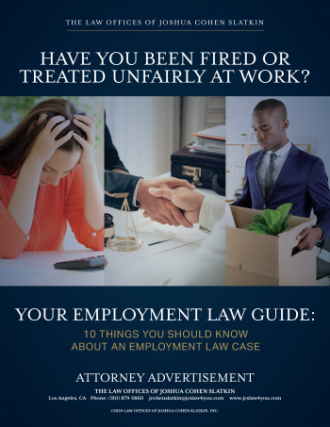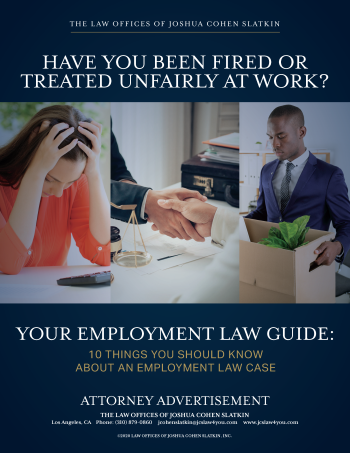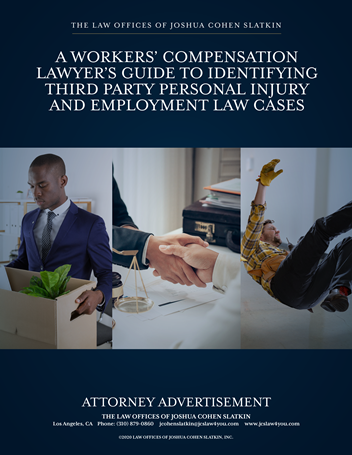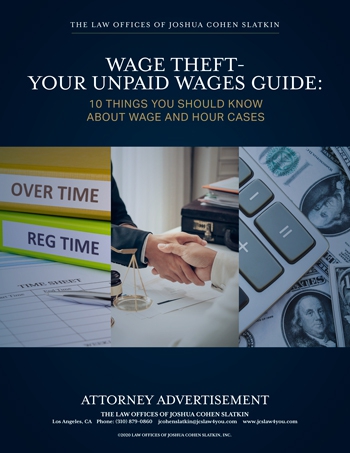
Unfortunately, pregnancy discrimination is quite common in the United States. Having a healthy pregnancy and bringing a child into the world is challenging enough without also having to worry about losing your job or being treated differently or unfairly by employers who disapprove of your plans to expand your family.
As a pregnant woman, you are protected by state and federal laws that prohibit pregnancy discrimination in all aspects of employment. California law protects employees against discrimination or harassment because of an employee’s pregnancy, childbirth, or any related medical condition. California law also prohibits employers from denying or interfering with an employee’s pregnancy-related employment rights. If you’ve faced discrimination or harassment from a prospective or current employer due to pregnancy, childbirth, or a related medical condition, you may be entitled to compensation.
At JCS Law Firm, our Los Angeles-based employment attorneys can help you report discrimination to the appropriate agency, take legal action to hold the discriminatory employer accountable, and recover any financial losses.
Legal Protections
A number of state and federal laws provide pregnancy-related protections for workers. These federal laws may apply to your pregnancy discrimination case.
- The Pregnancy Discrimination Act (PDA) prohibits employers from discriminating against job applicants or workers based on pregnancy, childbirth, or related health conditions. It also requires employers to provide pregnant workers with the same accommodations available to employees who are temporarily disabled or on leave for medical issues.
- The Americans With Disabilities Act (ADA) makes employers responsible for providing reasonable accommodations for workers suffering from gestational diabetes or other pregnancy-related health problems.
- The California Family Rights Act (CRFA) authorizes eligible employees a total of 12 weeks of paid or unpaid job-protected leave during a 12-month period for baby bonding purposes for the birth of a child or adoption or foster care placement of a child.
- Paid Family Leave (PFL) provides California employees with benefit payments of approximately 60-70% of your weekly wages earned 5 to 18 months before your claim start date to bond with a new child.
- The Family Medical Leave Act (FMLA) authorizes eligible employees twelve weeks of job-protected, unpaid leave for certain family and serious medical reasons, including those related to pregnancy and childbirth. FMLA leave runs concurrently with the CRFA and PDL for purposes of pregnancy-related leave.
- California’s Pregnancy Disability Leave (PDL) requires your employer to provide you with paid or unpaid pregnancy disability leave of up to four months (or 17 and 1/3 weeks) and return you to your same job when you are no longer disabled by your pregnancy, or, in certain circumstances, to a comparable job.
Typically, California state anti-discrimination laws provide much broader protections—and apply to more businesses and workers—than their federal counterparts.
- The California Fair Employment and Housing Act (FEHA) makes it illegal for employers to discriminate on the basis of pregnancy or conditions related to childbirth and requires that they make reasonable accommodations for pregnant workers with medical restrictions.
- Under the FEHA and pregnancy-related protections, your employer is required to provide Pregnancy-Related Accommodations for your pregnancy and related medical conditions, which may include a medical leave of absence and various workplace accommodations so you may care for your child.
Contact Us for a Complimentary Case Review
You have the right to work in an environment that’s safe and free from unlawful discrimination. If you have experienced pregnancy discrimination in hiring or employment, you’ve come to the right place for help. At JCS Law Firm, our exceptional attorneys can help you seek a legal remedy. Contact us today to schedule an appointment for a free case evaluation.

Your Employment Law Guide: 10 Things You Should Know About an Employment Law Case
You can’t protect your rights as a California employee if you don’t know what they are. Request a free download of our employment law guide here.
View All
Recognizing Pregnancy Discrimination in Hiring and Employment
Pregnancy discrimination comes in many forms. Some may not be immediately obvious but all are illegal. Examples of employer actions that could potentially be considered pregnancy discrimination include:
- Refusing to hire job applicants—or firing employees—due to pregnancy or plans to become pregnant
- Demoting workers—or docking their pay—because of pregnancy or maternity leave
- Firing workers who took maternity leave
- Denying pregnant employees equal pay or benefits
- Refusing to provide pregnant workers with opportunities for training, advancement, or special assignments
- Changing a pregnant employee’s job assignments without a valid reason
- Refusing to grant temporary disability leave to pregnant employees while making it available for employees with other medical conditions
- Forcing a pregnant employee to remain on leave until her baby is born and not providing workplace accommodations.
Holding an Employer Accountable for Discrimination
Holding an employer accountable for pregnancy discrimination is possible, but this area of the law is complex. Fortunately, an experienced employment lawyer can help you navigate the process. Depending on the facts and evidence in your case, you may be able to recover compensation for a wide range of damages, including:
- Past and future lost wages and benefits
- Emotional distress damages
- And other losses available under the law associated with pregnancy discrimination








